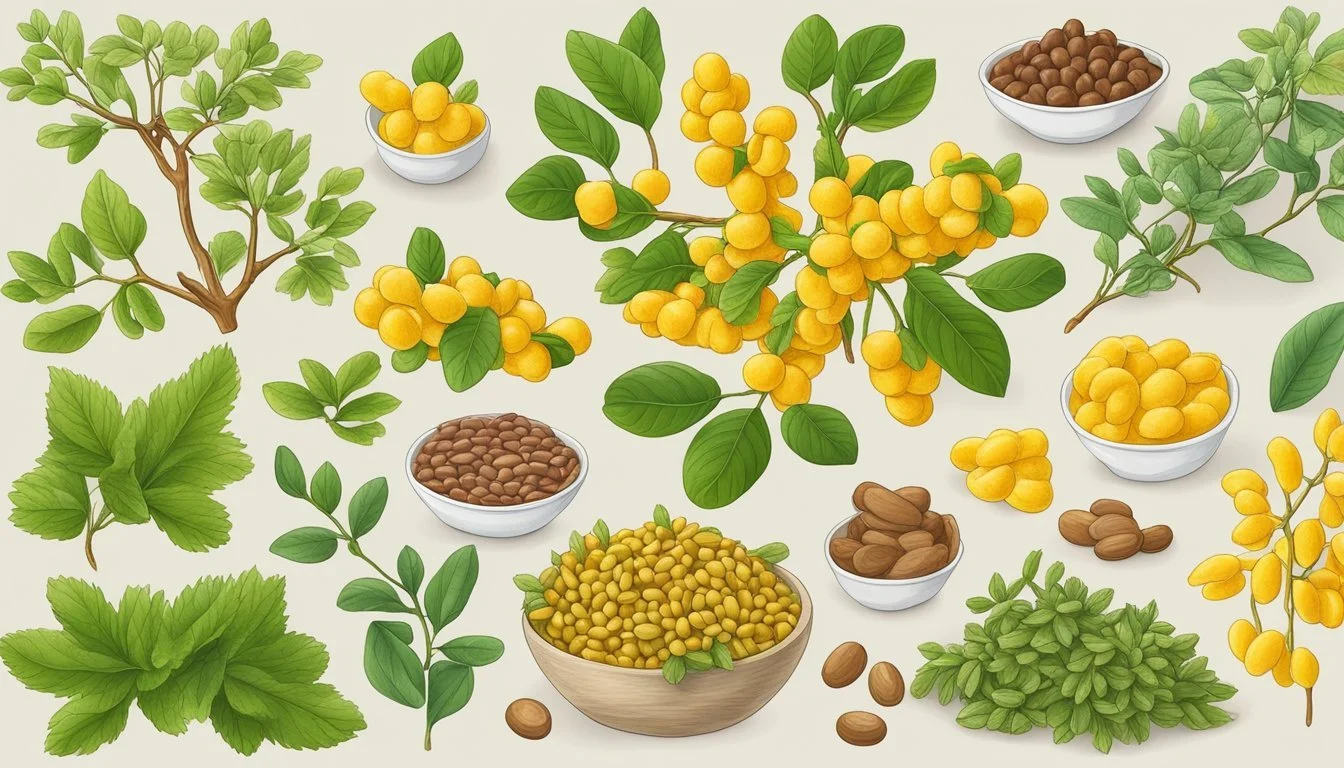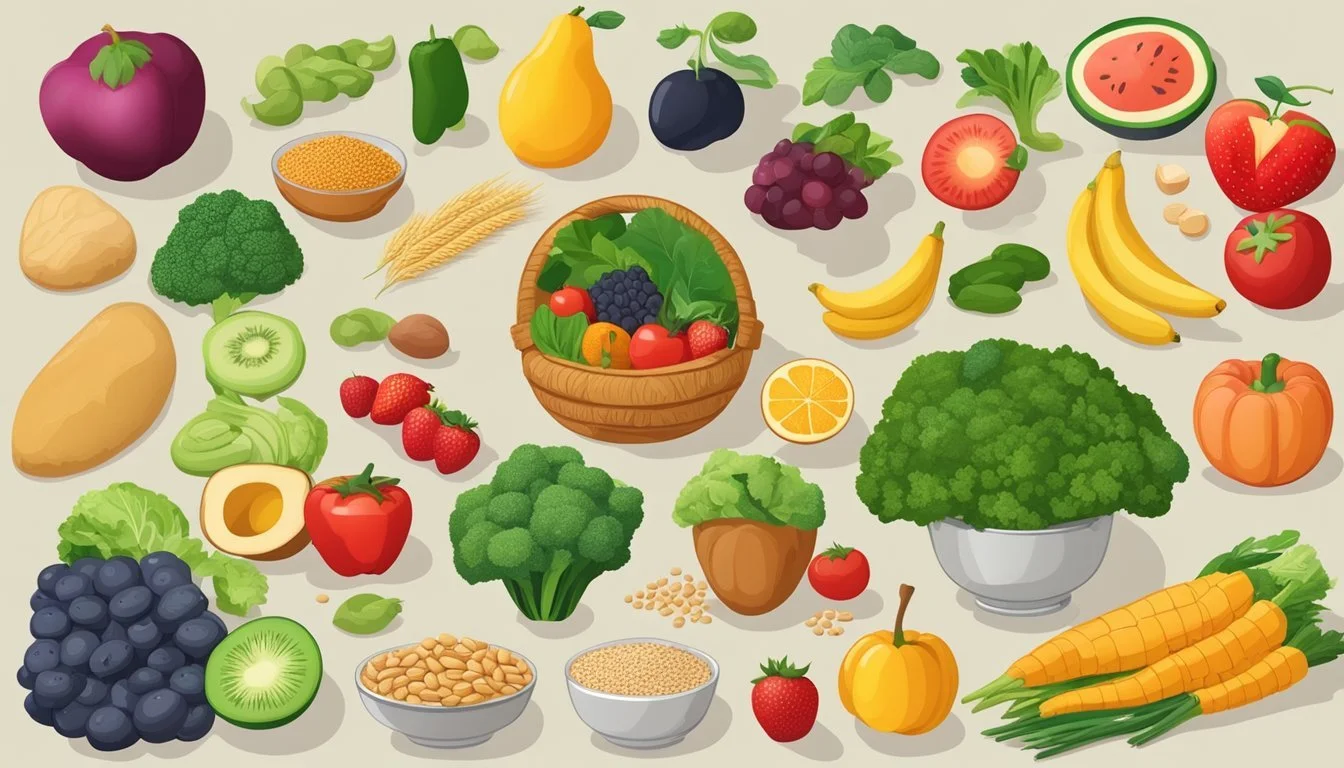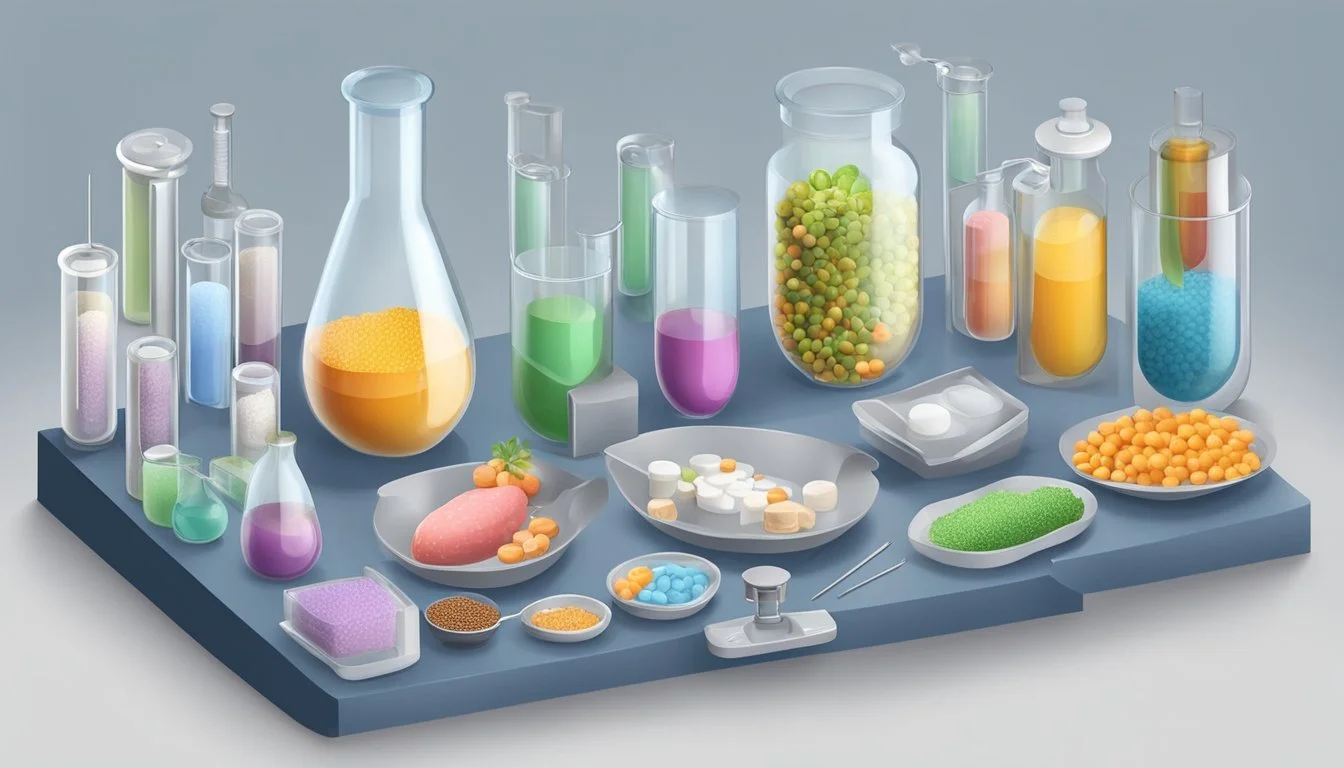Essential Foods That Support Your Pancreas and Boost Insulin Production
Maintaining a healthy pancreas is crucial for the body's ability to produce insulin, a hormone essential for regulating blood sugar levels. A well-balanced diet plays a significant role in supporting pancreatic function and improving insulin production.
Understanding how certain foods can stimulate the pancreas to produce insulin can empower individuals to make better dietary choices. This article explores various foods and dietary habits that can assist in maintaining optimal pancreatic health and enhancing the body's natural insulin production.
1) Bitter Melon
Bitter melon is known for its potential benefits in managing diabetes through its insulin-like effects on the body.
It contains several chemicals that mimic insulin, helping to reduce blood sugar levels.
These components may stimulate the pancreas to produce more insulin, aiding in better glucose regulation.
Research indicates that bitter melon may also suppress appetite, thereby reducing food intake and helping maintain stable blood sugar levels.
Typical dosages include 50 to 100 milliliters of juice or 5 grams of powdered fruit, taken three times daily, but caution is advised due to possible side effects such as gastrointestinal issues.
Always consult with a healthcare provider before incorporating bitter melon into a diabetes management plan.
2) Fenugreek Seeds
Fenugreek seeds have shown potential in aiding the pancreas to produce insulin. Research has indicated that these seeds contain 4-hydroxyisoleucine, an amino acid that can stimulate the pancreas to release insulin.
Studies have demonstrated that fenugreek can improve glucose metabolism. The seeds have been found to increase glucose-induced insulin release in pancreatic cells, both in humans and animals.
Additionally, fenugreek seeds have compounds that can enhance the insulin receptor's function. This includes the phosphorylation of key proteins involved in insulin signaling pathways, which may help improve insulin sensitivity.
The ability of fenugreek seeds to lower blood sugar levels has also been noted. They may reduce glucose absorption in the intestines, thus playing a role in preventing hyperglycemia.
These properties suggest that fenugreek seeds could be a valuable addition to the diet for managing blood sugar levels and supporting pancreatic function.
3) Turmeric
Turmeric is a yellow-orange spice that belongs to the ginger root family. It is commonly used in Indian cuisine and has been praised for its potential health benefits.
Turmeric contains curcumin, a compound known for its anti-inflammatory and antioxidant properties.
In the context of pancreatic health, curcumin may aid in improving insulin sensitivity.
It helps the pancreas function more efficiently, which can be beneficial for managing blood sugar levels.
Studies suggest that curcumin can reduce inflammation in the pancreas, potentially aiding in its ability to produce insulin.
For those with pancreatitis, turmeric may offer digestive benefits.
Its anti-inflammatory properties can help alleviate the condition's symptoms, thus supporting overall pancreatic health.
Integrating turmeric into a balanced diet could provide a natural way to support pancreatic function.
Turmeric can be easily incorporated into meals.
It can be added to soups, stews, or even smoothies.
Dietary supplements containing curcumin are also available but should be taken under medical supervision.
By including turmeric in a daily diet, individuals may support their pancreas's ability to produce insulin more effectively.
4) Ginseng
Ginseng is known for its potential benefits in managing type 2 diabetes. This medicinal plant contains ginsenosides, which may help stabilize insulin and glucagon levels. By doing so, ginseng can aid in maintaining balanced blood sugar levels.
Studies indicate that ginseng may enhance insulin sensitivity. This effect can improve how the body responds to insulin, thereby supporting better glucose management. Enhanced insulin sensitivity can be particularly beneficial for individuals with insulin resistance.
Research shows that ginseng may boost insulin production. It is believed to stimulate pancreatic β-cells, which are responsible for producing insulin. In addition, ginseng may protect these cells from stress and damage.
The active components in ginseng, like ginsenosides, play a crucial role in these processes. Ginsenosides have been shown to contribute to increased insulin secretion and reduced cell apoptosis in pancreatic β-cells.
Ginseng's influence extends to muscle and fat tissues as well. The plant has been observed to mediate pathways like GLUT4, which facilitate glucose uptake in these tissues. This further supports its role in managing blood sugar levels effectively.
5) Berberine
Berberine is a naturally occurring compound found in various plants like goldenseal and barberry. It has been gaining attention for its potential health benefits, particularly in managing blood sugar levels.
Berberine has been shown to promote insulin secretion from pancreatic β cells. Unlike traditional insulin secretory agents, it does not cause hypoglycemia, making it a safer option for managing type 2 diabetes.
It also helps in improving insulin sensitivity, aiding the body's ability to utilize insulin more effectively. This action is particularly useful for individuals with insulin resistance, a common feature of metabolic syndrome and type 2 diabetes.
Additionally, berberine may reduce the risk of pancreatic inflammation and has been suggested to hold potential against pancreatic cancer. Both these properties can contribute to better pancreatic health and function.
6) Aloe Vera
Aloe vera has been studied for its potential benefits in diabetes management. Some research indicates that aloe vera juice or supplements can help lower fasting blood glucose levels. This can aid the pancreas by reducing the demand for insulin production.
Aloe vera contains compounds such as lectins, mannans, and anthraquinones. These compounds may have anti-inflammatory and antioxidant properties. Reducing inflammation and oxidative stress can support pancreatic health.
It's important to note that while some studies show promising results, the effectiveness of aloe vera can vary. People with diabetes should consult with healthcare providers before incorporating aloe vera into their regimen.
Overall, aloe vera might offer supplementary benefits for those looking to support their pancreatic function and insulin production.
7) Spirulina
Spirulina, a type of blue-green algae, is rich in nutrients that can benefit the pancreas.
It contains high levels of protein, vitamins, and minerals, which support overall pancreatic health.
Studies suggest that the antioxidants in spirulina, such as phycocyanin, can reduce inflammation in pancreatic tissues.
Spirulina also has potential to improve glucose metabolism.
It may help the body use insulin more efficiently, reducing the strain on the pancreas.
Including spirulina in the diet could therefore aid in maintaining healthy insulin levels.
Commonly available in powder or tablet form, spirulina can be easily incorporated into meals.
It's advisable to consult a healthcare provider before adding it to your diet for personalized guidance.
8) Cinnamon
Cinnamon has been shown to have potential benefits in managing blood sugar levels. Studies indicate that cinnamon can reduce hemoglobin A1c by 0.27% to 0.83% in individuals with type 2 diabetes. This reduction demonstrates its potential in aiding the pancreas in insulin regulation.
The spice can also help in lowering fasting blood sugar levels by up to 52.2 mg per deciliter. This significant decrease underscores its usefulness in glycemic control, enhancing the pancreas's ability to manage blood sugar efficiently.
Research highlights that cinnamon supplementation enhances insulin sensitivity. Improved insulin sensitivity means the body's cells can better respond to insulin, reducing the strain on the pancreas to produce excess insulin.
Incorporating cinnamon into a balanced diet may offer long-term benefits for insulin production and overall pancreatic health. This natural approach can be a valuable addition for those looking to maintain healthy blood sugar levels.
9) Holy Basil
Holy basil, known scientifically as Ocimum sanctum, is an herb traditionally used in Ayurvedic medicine. It is considered an adaptogen, meaning it helps the body manage stress.
This herb can support the pancreas in insulin production. Studies suggest that holy basil helps to regulate blood sugar levels which is crucial for pancreatic health.
By reducing cortisol levels, holy basil helps in maintaining balanced insulin levels. This can alleviate the burden on the pancreas, potentially enhancing its overall function.
To incorporate holy basil into the diet, it can be consumed as a tea, supplement, or fresh leaves added to meals. This may promote a healthier pancreas, aiding in natural insulin production.
Regular consumption should be discussed with a healthcare professional to ensure it is appropriate for individual health needs.
10) Milk Thistle
Milk thistle (Silybum marianum) is a plant with a long history of use for liver support. It contains compounds known as flavonolignans, collectively called silymarin.
Silymarin has shown potential benefits for individuals with type 2 diabetes. Research indicates it may help lower fasting blood glucose levels and improve insulin sensitivity.
In studies, milk thistle supplementation led to reductions in A1C levels. It may also support overall metabolic health by modulating lipid profiles and aiding in liver function.
Milk thistle's role in diabetes management primarily involves supporting insulin regulation and reducing associated complications. By helping to maintain better glycemic control, it can be a valuable part of a comprehensive dietary approach.
Understanding Pancreas Function
The pancreas plays a crucial role in both digestion and hormone production, significantly impacting overall health. Its interactions with other organs illustrate its importance in maintaining balance in the body's systems.
Role in Digestion and Hormone Production
The pancreas has two main functions: exocrine and endocrine. In its exocrine role, the pancreas produces digestive enzymes such as amylase, protease, and lipase. These enzymes are essential for breaking down carbohydrates, proteins, and fats in the small intestine, facilitating nutrient absorption.
In its endocrine role, the pancreas produces hormones, most notably insulin and glucagon, through clusters of cells known as the islets of Langerhans. Insulin, produced by beta cells, helps regulate blood glucose levels by facilitating the uptake of glucose into cells for energy. Glucagon, produced by alpha cells, works to raise blood glucose levels by signaling the liver to release stored glucose.
Interaction with Other Organs
The pancreas interacts closely with other organs to maintain homeostasis. For instance, it communicates with the liver to regulate blood sugar levels. When insulin is secreted, it prompts the liver to store glucose as glycogen. Conversely, glucagon signals the liver to convert glycogen back into glucose when blood sugar levels drop.
Its interaction with the stomach and small intestine is vital for digestion. Pancreatic juices are released into the small intestine to aid in breaking down food particles for absorption. Additionally, the pancreas works in conjunction with the gallbladder and liver to manage bile production and secretion, further aiding in fat digestion.
These roles exemplify the pancreas's importance and complexity in both digestive and endocrine functions.
Nutritional Strategies to Support Insulin Production
A balanced diet is essential for aiding the pancreas in insulin production. Understanding how specific macronutrients affect insulin sensitivity can help in managing overall health.
Importance of a Balanced Diet
A balanced diet ensures that the body gets all the essential nutrients it needs to function efficiently. Foods rich in vitamins and minerals support the pancreas and help regulate insulin levels. For instance, leafy green vegetables such as spinach and kale are beneficial because they contain vitamin K and antioxidants which reduce tissue inflammation.
Macronutrients and Their Impact
Proteins and fats can influence insulin sensitivity differently across individuals. While glucose is a known driver of insulin, recent studies highlight variability in how people respond to proteins and fats. Whole grains like quinoa and oatmeal are good options as they maintain blood sugar levels without spiking insulin.
Incorporating a variety of macronutrients—proteins, fats, and carbohydrates—sourced from whole foods can maintain insulin balance. Avoiding excessive consumption of high-sugar foods is also crucial, as it adds stress on the pancreas and can worsen insulin resistance over time.
Scientific Research on Foods Beneficial for the Pancreas
Scientific studies have shown that dietary choices can significantly impact the health and function of the pancreas, with certain foods promoting insulin production and balancing blood glucose levels effectively.
Studies on Dietary Interventions
Research indicates that a balanced diet rich in fruits, vegetables, whole grains, and lean proteins can benefit the pancreas. A diet high in leafy green vegetables like spinach and kale, known for their vitamin K content, has been linked to reduced tissue inflammation. This is significant because inflammation can impair pancreatic function and insulin production.
Animal experiments have shown promising results with fasting-mimicking diets as well. These diets seem to regenerate pancreatic beta cells, which are crucial for insulin production. While these findings are from animal studies, they offer a potential pathway for human dietary interventions to support pancreatic health.
Emerging Research Findings
New studies highlight the role of specific foods and fasting diets in boosting pancreatic functions. For instance, the consumption of dark green leafy vegetables has been associated with a lower risk of pancreatic cancer. Though limited, human trials have begun to explore these relationships more deeply.
A recent study focused on the fasting-mimicking diet showed that even partial fasting could regenerate beta cells and restore insulin production in diabetic mice. This method tricks the body into thinking it's fasting, helping reboot crucial pancreatic functions. Future research may further validate these findings and potentially lead to new dietary guidelines for supporting pancreatic health.









